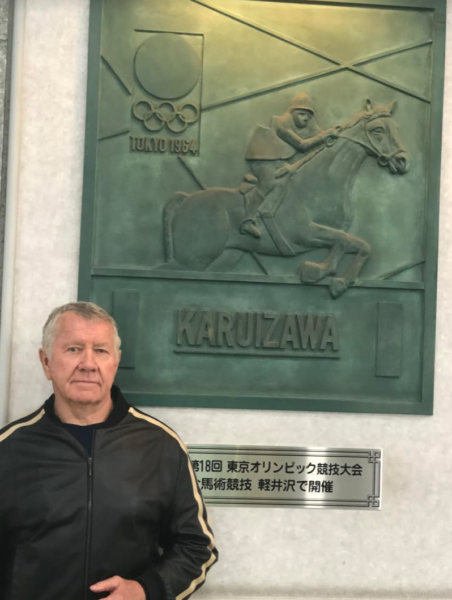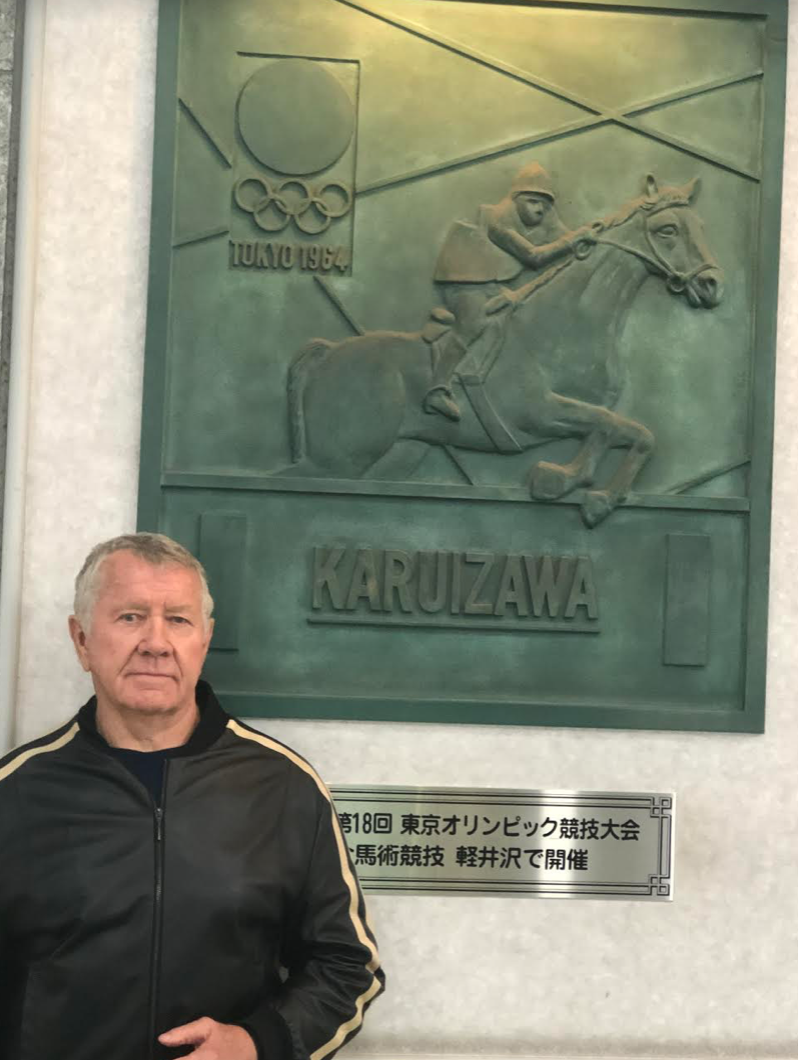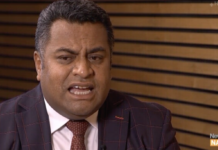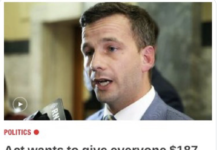
South Africa’s domestic policy was and is South Africa’s problem – in my view.
The Tour
I was seconded to Red Squad second in command from my position as Control Room supervisor – senior sergeant rank.
At the time, I was in my final year of a Bachelor degree at Auckland University, married with a young daughter. I had played senior first division rugby until 1980 but I was not enamoured with the Tour as I had ‘moved on’ from rugby culture and was certainly not enthusiastic about being taken for 3 months from my wife and child and university studies.
Red Squad comprised 51 personnel – including one female (constable Judy Olsen). The Squad prepared for the tour at Papakura Military SAS training facility. Together with Blue Squad – a sister group from Wellington, we were trained in ‘new’ riot/protest strategies and primed to travel as personal escorts to the Springbok.
The second game of the Tour was at Hamilton. By this time police realised the protest movement was well organised. C.I.S. (police spies) advised Red Squad commanders and other police commanders preparing for the encounter at Hamilton rugby-park that the plan of the protestors was to break into the rugby ground from the north fence line. This was an extension of the strategy applied by the protestors at the first game in Gisborne.
Hamilton brought a new dimension to cohesiveness among protest groups that alarmed police because of the size of its mass. Red Squad recognised the threat early in the day and petitioned the scene commander to let Red Squad confront the ‘mob’ in the streets as the mob approached the ground. This request was denied and the rest is history.
By confronting a mob on the move, legal justification exists to use force to prevent a potential breach of the peace. Police had good cause to suspect a breach of the peace would ensue – if protestors mixed with rugby supporters and this concern did manifest later in the day when protesters were attacked by rugby supporters. However, once the mob was ensconced on the rugby pitch sitting peacefully, then no legal justification existed for police to ‘sort them out’.
Video proves that police inside Hamilton rugby-park (where I was a commander) did not use any force other than to attempt to physically lift and carry some of the hundreds of protestors from the ground in a vain attempt to allow the game to start.
Once the protestors had entered the ground and then sat or stood passively, no justification at law existed for police to move into them with batons and Red Squad did not do this.
Trying to carry protestors off the ground was futile and eventually the game was called off. However, when the crowds were leaving the ground and intermingled with protestors who were still in the vicinity, breaches of the peace did ensue with many protesters being assaulted – by rugby supporters – not by police.
The ‘defeat’ of police by the protestors at Hamilton Rugby Park did have an effect on most police and on me. Whereas until that day I didn’t give a damn, that event galvanized me to demand an opportunity to restore one’s pride in an outfit (the police) in which at that stage of my career I still had pride. And so, when Commissioner Walton said to the nation after the event: “If I had had the entire police force at the ground I could not have done more,” I knew he was talking a crock of crap.
At the time, I was secretary of Justice Minister Jim McLay’s Birkenhead electorate machine. I called McLay (*1) and told him that if Red Squad had been let out of its cage under the grand stand at Hamilton and been given the freedom to confront the protestors in the street before they broke into the ground unchallenged, Red Squad would have prevented that debacle.
Prime Minister Muldoon was out of the country at the time but a few days later when Red Squad was in New Plymouth with the Springbok and the media were reporting the Tour would not proceed, I received a phone call from Muldoon. (*2) Muldoon had returned from abroad and he asked me to repeat what I had told McLay. I did. This was heady stuff for me because here I was but a mid-rank cop and a junior volunteer in the National party and the Prime Minister calls me!
The Taranaki game went ahead with little fanfare but the next game at Palmerston North saw Red Squad confronted once again by a large body of protestors. This time however Red Squad was deployed in the front line and met the protestors miles from the rugby ground. It was also the first time that the riot gear and long batons we take for granted now in New Zealand, was displayed in a manner that signalled; ‘New Rules’.
Significant also, as the protestors loomed toward the red line, Commission Walton appeared at my side and said: “I don’t care what you do senior but stop them.” (*3) And we did.
We did so at this venue by presenting Red Squad as a formidable force. This psychological ‘warfare’ obviated the need for Red Squad to resort to actual force. Presenting Red Squad as a formidable disciplined unit unflinching in face of overwhelming odds had the effect of deterring most opponents.
Until the second test at Wellington, Red Squad was pretty much immune from the day to day petty street clashes. However, all that changed in Rintoul Street, Wellington.
At this venue the protest movement had organised themselves into passive protest groups, nosey large numbers of protesters and a third grouping of hard core protestors. Often this later grouping included gang members and which was increasingly kitted out with hard hats (motorbike helmets) padded clothing, wooden shields and offensive weapons such as baseball bats and incendiary devices.
In Wellington, the first time this ‘hard core’ worked as a unit – about 1000 in number – Red Squad was deployed to confront them. The ensuing clash saw many protestors bloodied and beaten with PR 24 batons by the riot gear equipped Red Squad.
The objective of Red Squad was, as was the case at all venues, to prevent protesters invading the rugby grounds where, based on the experience of Hamilton, police could reasonably expect serious violence between the different groups.
At law, police have a duty of care to the public they serve and the state they protect, to prevent beaches of the peace and they are authorised by law of the country passed in parliament, to use force to achieve their objective.
The second time Red Squad really rumbled was outside Eden Park, Auckland on the day of the last test. September 12, 1981 – a day of infamy in the view of many.
By this time the hard core of the protest movement had grown in size and determination and when they attempted to approach Eden Park via the Eastern sector, Red Squad was waiting.
The violence which ensued was the most extreme the country had witnessed to that point of time in its history (with the exception of Maori Wars campaigns) and nor has that level of violence been repeated since that day.
Justice
Did police overdo it?
The ‘Clowns Affair’ is some evidence that Red Squad did over react at some point. But on a day when my squad members sustained broken legs, broken arms, broken collar bones, ruptured ear drums, broken pelvis in a fluid environment of mass violence over 2 hours of back and forth along some 500 meters of roadway!?
When a minority sized squad of police facing overwhelming odds * of armed violent rock throwing baseball bat wielding helmeted incendiary device throwing gang members rumbling for the fun of it with other protestors from the bent-on violence section of what was otherwise a peaceful protest movement happens, excesses on both sides were bound to happen.
*In Onslow Road outside Eden Park Section One of Red Squad of 21 personnel, confronted over 2000 hard core protestors.
An inquisition into Red Squad’s conduct commenced after the Tour euphoria subsided and the mood of public support for the Police actions during the Tour began to abate. Several police officers from other units were charged with various levels of assault and violence. Red Squad never had any members charged.
This suggests that in spite of the best endeavours of the Inquisitors (internal police prosecution section), Red Squad actions were compliant with the law. However, the demand for a Red Squad scalp was intense and on one occasion I was implored by a member of the Police association (an organisation whose objective is to help police), to “Give the commissioner one. All he needs is one!”
This incident remains vivid in my mind and due only to a mistake in downloading the recorded conversation I had in the control room (where I took the phone call which conveyed the request for a scapegoat), I would today name the despicable police officer * who was clearly seeking to ingratiate himself with the commissioner at the expense of Red Squad.
But the facts speak for themselves. No Red Squad members were charged with any crimes.
* For as with all accounts I publicise -whether related to my police or political career, if I don’t have corroborating evidence, I let the matter lie.
Note:
There is a movie- “Breaker Morant” – based on fact – commanders of an Australian unit in South Africa during the Boer War – following Commander- in- Chief Kitchener’s verbal instructions, “Take No Prisoners” – later find themselves before a Court Martial for War Crimes – and were executed. After the Tour, Red Squad were not ‘executed’, but the Squad and personnel were intimidated, humiliated, treated unlawfully and persecuted. The similarity between Red Squad and Breaker Morant’s squad – is not lost on me.
Politics
Politically significant perhaps is that in 1988 – seven years later when I was a Member of Parliament, Winston Peters and I was having a whiskey with Muldoon one evening and was chatting about the Tour. It was then that Muldoon confirmed what I thought at the point when Walton stood at my shoulder in Palmerston North, when Muldoon said: “I was very pleased to receive your report from New Plymouth and as a result I told Bob (Walton) that if he didn’t stop the protestors next time out, he would be out of a job.” (*4)
Today I look back and see the Tour as a blatant political ploy by Muldoon to divide the country (which the tour did) pretty much down electorate boundaries of conservative versus liberal (which voted as Muldoon’s statisticians had predicted) to give him a one majority to form his last government.
Personal
Yes, the tour had a profound effect on my life.
Initially I couldn’t give damn about the Tour. I had better things to than traipse around the country looking after rugby players
But defeat of the police at Hamilton was a humiliation felt by the police and I was no exception. I wanted revenge. Therefore, I wanted the Tour to continue so the police could redeem.
Because of the ‘praetorian guard’ image which grew around Red Squad – fostered in my view principally by its persistent appearance in public as a highly disciplined unflinching unit, media created a myth that Red Squad was the epitome of the violence which was occurring at most venues where police from other routine units were being confronted by isolated pockets of excessive zeal by protesters and where violence erupted.
Following the Tour, I wrote the book: The Red Squad Story – which was the Best Seller in NZ for several months and also sold widely in South Africa. The book elevated my profile – to the extent that it facilitated my entry into parliament as a National MP.
But the book also had a downside. Because I disobeyed an instruction from Commissioner Walton not to publish the book, this had an adverse effect on my promotion to commissioned rank. I was due for promotion by examination, ratings and additionally because I graduated with a university degree (being then one of only 5 per cent of the police officer corps with a degree – as opposed to ninety-five per cent of the military officer corps at the time) – but by various ruses I was denied promotion to inspector until Walton resigned in 1985.
Note:
This adverse relationship between Walton and me was first exposed during the Royal Commission of Enquiry into the Arthur Allan Thomas convictions for murder, when I (having been a scene detective with a critical role in the early stages of the Crewe investigation) refused to change my evidence from what I had said at previous trails – when pressured to do so by Commissioner Walton to do so before I took the stand at the Royal Commission). (*5)
As a result of the book I became the face of Red Squad and when elected to parliament my profile was elevated. It was therefore, I who copped the vilification, odium and contempt which was being heaped upon Red Squad as the tide of public opinion which during the tour split the nation 50/50 for/against, turned overwhelmingly to, opposed to the Tour.
These days, my business has taken me to intrepid fields: Lithuania, Russia, Western Sahara, Syria and North Korea and I am Honorary Consul for Morocco. I was a Member of Parliament for 9 years where I was also involved in more than a fair share of drama: e.g. the ‘Sale of Army surplus weapons to a foreign government’ scandal; being fired from The Executive (under-secretary i.e. junior minister) because I took a position as a director on a Russian owned bank and after parliament, the Scampi Affair (which falsely alleged corrupt conduct among Rt Hon Winston Peters, several fisheries oligarchs and myself).
But I am still more widely recognised as a police inspector and for Red Squad than these activities. Point is: Red Squad made an impact.
My opinions on the Tour have varied with my exposure to events at the time and to knowledge gained subsequent to the Tour. I refer you to an article written by me 2007: “Deep in the Forest” (*6) which explains the significant changes in how I view police today vis-a-viz how I viewed the police when I was excessively infected with the virus of ‘police culture’.
Overall, I view my association with ‘that period’ as pretty much having been handed a poison chalice.
Why me? I have often asked, who was thrust into the lime light when I began life as a simple country boy from up north often milking the cows as a kid when the old man was stuck in the pub.
A chalice which made me famous or infamous – depends on your point of view.
The vicissitude of life, one might say.
Bibliography:
(6): “Deep in the Forest”, Sunday Star Times, Oct 27, 2009 (available via my name and article @ goggle). http://www.converge.org.nz/pma/hr271007a.htm
(*1 -5) are all events previously in the public arena after I resigned from the police and which put Walton and me at variance over the veracity of what I have said. But I was never sued and that is usually the case when one tells the truth.
Ross Meurant:
After 21 years as a cop, Meurant resigned with the commissioned rank of inspector O/C Criminal Intelligence Section & V.I.P. Security; a nationwide profile role as a Red Squad riot group commander and an earlier reputation as a ruthless detective with a tendency to enforce the rule of police.
During 9 years as a Member of Parliament and the Executive as Under Secretary, he was accused of being an arms trader; was fired from the Executive by Jim Bolger for having a perceived conflict of interests (becoming a director of a Russian bank) and started the first political party to be registered under MMP.
After 4 years in the wilderness teaching kids to ride horse and property developing, he returned to Wellington as parliamentary adviser to Rt Hon Winston Peters where allegations of conflicted interests with roles he had with three major fishing companies and a race horse baron and later in false allegations of corruption culminating in the Scampi Enquiry.
From 2005 Ross lived abroad pursuing commercial options in Zimbabwe, the Balkans, Czech Rep, Syria, Russia, Morocco, UAE, Iran & North Korea.
Today in New Zealand he is trustee and managing director of NZ forestry and property assets owned by absentee Russians & Honorary Consul for Morocco.
Ross has a B.A. in politics; a Master’s in economics and law and COPs in law. He speaks Russian, rides horses and water-skis.
He is the author of:
Two biographies: The Red Squad Story & Beat to the Beehive.
Two novels: The Syrian Connection & Sex, Power and politics.






Ross, what an insightful commentary. I was not born during those times but what strikes me the most about your life in the Police and over that relevant period of time is how you evolved to understand how you were thrust into an extraordinary environment for the time and used (and probably abused) by the political dictates of that era. I have seen the film Breaker Morant and I agree with your analogy.
I also detect in you a sense of social justice and a level of integrity not often seen then nor today – especially when you refused to change your evidence in relation to the Arthur Allan Thomas enquiry. I was not born then but I have read about that case.
Merry Christmas
I have a copy of “Red Squad Story” on my bookshelf to this day, to remind me what arseholes the NZ Police and state forces were over the 1981 tour
and I have a copy of Tom Newnham’s “By Batons and Barbed Wire” reminding of the superb organisation of ordinary New Zealanders in solidarity with others thousands of miles away
I was at the Eden Park final test protests, never forget Peter Gabriel’s “Biko” in Fowlds park prior, and got helmet dents from Police batons on Sandringham Rd near some skip bins, but no serious injuries unlike too many others, spent that whole winter training, protesting and keeping an eye on dodgy coppers–those were the days alright, but really…Meurant’s reflections may impress some, but he has never fully recanted, the past cannot be undone
Meurant was an arsehole then and he hasn’t changed. He has changed much of history to try and redeem the police reputation. I remember the party in Wellington the Red Squad crashed in full riot gear prior to the game to use their new techniques. The fact was without the police spies in the protest organization there would have been no games played!
No police were ever charged for their many illegal acts because no police are ever charged.
He and his ilk have fundamentally changed the way New Zealanders look at police and they broke the social contract with their response.
I’m not convinced Ross is an arsehole per se, that is to say I don’t sense any sadistic or sociopathic overtones in his account and am confident his intentions, well-founded or not, are genuinely in the interest of a respectfully functioning society.
Nevertheless I agree with your assessment of the implication that no Red Squad members being charged is ‘the facts [speaking] for themselves’. In fact that seems uncharacteristically dense of him to see the lack of charges as satisfactory evidence of no legal transgressions to a society who have throughout history watched countless abhorrent blatant crimes go uncharged.
Never trust a cop.
This place is also for people who have lost there faith.
You might be surprised how much Meurant is like my grand parents. Stoic, stiff upper lip. Built his own house, helped build this country. I’v a lot of time for people like my prand parents.
People who want to renew their faith in New Zealand, this is a good place to start.
no shit Sam! I’ve done all those things too . And raised 3 Functioning, contributing members of society.I also live a sustainable life and grow 70% of my own food I also grew the trees which I used to build my current home. I have been a volunteer worker for 30 years.
I still don’t trust cops!And would never believe anything Meurant says about the Red Squad. Pack of thugs!
You hit the nail on the head there “Shona”, what a load of White Middle-class Crap. Anyone can be a bully if they are armed and protected by the government – but at the end of the day they have to face their kids and their grandkids and own up to the fact that they were employed as stooges for the ruling class human rights abusers. As you say NEVER TRUST A COP.
In my view the Governor General Sir David Beattie should have enjoined the Police not to intervene in those protests, as Muldoon was in breach of the Gleneagles Agreement. Muldoon betrayed the country and the crown/commonwealth by doing so, he also refused all petitions and refused to meet with Sir David at all about it.
Due to the NZ Police being the ROYAL New Zealand Police, Beattie should have made an interdiction at that point yet failed to do so, possibly as he was patron of the NZRFU, possibly he was too busy saving up for his Mercedes collection. Muldoon was a boorish oaf. He should have left to be torn apart by the protesters all by his lonesome! Instead he hid behind the Police and used them, he put them at mortal risk to defend the indefensible, and in a position to be vilified and scapegoated. That was the essence of the poison chalice situation.
What do you reckon, Ross?
I totally blame Muldoon for that winter.
That article tells me History will teach us nothing.
We can be on the right side of it but when people like Meurant call the tune it will repeat.
Move away from the plaque please Mr Meurant
https://www.youtube.com/watch?v=lwK5rJTxLdE&t=5s
Comments are closed.